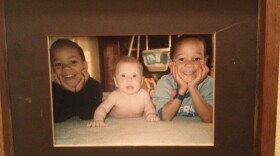This is the version of our story that aired on Michigan Radio. To hear an extended version of our interview with Robin DiAngelo on the theory of white fragility, click here.
Robin DiAngelo was right out of college when she started thinking about it. She'd landed a job leading workshops on racism. And she met a man who became very angry, and pounded on a table. He said white people are the target of discrimination, white people can’t even find jobs anymore.
DiAngelo looked around the office and she saw nothing but white people, all of them with jobs.
"It was unnerving," she says now. "It was like, 'This is not rooted in any racial reality that is happening, in this room, in this workplace, or in this man’s life.' And yet, these feelings are real. His rage is real. How do we do that?"
Meaning: How do white people see themselves as the victims of racism, when the world around them shows something totally different?
DiAngelo worked for years doing racism workshops, wondering this. Eventually, she developed a theory.
"I started thinking about how fragile our sensibilities are when it comes to race," she says.
Her theory is called "white fragility." You can read her original paper on it here. She also wrote about it in a book, called What Does it Mean to be White.
DiAngelo says white fragility starts from the moment of birth. Because of our segregation, those of us born white end up seeing mostly white people around us. Once we’re old enough to experience culture, we still see mostly white people – in children’s books, on TV shows. We live in segregated neighborhoods, where the white areas of town are inevitably seen as “good” and the areas where minorities live are “bad.” Schools are judged the same way.
"If we just gained our opinions from living our lives, following the trajectories laid out for us in schools and in our families, and in our kind of social interactions," DiAngelo says, "we will necessarily be ignorant about race and racism."
But that doesn’t stop us from forming opinions, many of them strongly held. And one of the biggest ones is about what racism means, and who is racist.
"The number one most effective adaptation of racism over time," DiAngelo says, "is the good/bad binary, this idea that a racist is a bad person and a good person is not racist. And so it’s about individuals who are either good or bad or who either do or don’t engage."
One of the side effects is that many white people come to believe that if they just don’t talk about or think about race, then they are not racist.
"Racism comes out of our pores as white people. It's the way that we are."
Then, if someone comes along and talks about racism the way DiAngelo does – that racism is a system of oppression. That anyone can be prejudiced, but in America, only white people are racist. And, actually, all white people are racist because, as DiAngelo says:
"Racism comes out of our pores as white people. It's the way that we are."
Well, hearing that is going to make you upset. Maybe make you feel under attack. Maybe make you pound a table.
"Almost any defensiveness that you get from a white person trying to talk about racism is rooted in that good/bad binary," DiAngelo says. "They hear you saying, 'You are a bad person.'"
The flip side, DiAngelo says if you think of yourself as one of the “good” white people, you think you’ve got it down. You see the latest person caught on camera using the "n-word," that’s what racism is to you. Whatever you’re doing isn’t racist.
And so you don’t think about the whiteness of your neighborhood, your school system or your office.
Understanding how racism plays a role in those daily situations takes thought and effort, DiAngelo says.
She’s been at it for two decades. And here’s what she can say today:
"I’m really confident that I do less damage to people of color than I used to do," she says. "That is what I can say to you. I do less damage than I used to."
And even that, she says, takes daily work.






